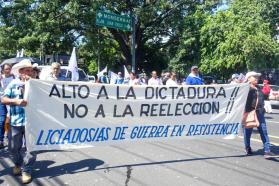Update: Funes Administration Calls for New Economic Model in El Salvador
Included in this update:
* Conference Elevates Struggle against National and Regional Mining Projects
* El Salvador’s First Sexual Diversity Unit Created to Defend LGBT Community
During the second week of April, President Mauricio Funes unveiled theadministration’s Plan Quinquenal (“Five-Year Plan”), the initial phaseof a 15-year strategy that will completely transform the country’seconomic model, replacing the failed neoliberal model and consolidatinga democratic system of governance by 2024 – a symbolic year marking the200th anniversary of Central American independence from Spain.Remarkably, this is the first time in over 30 years that anadministration has presented a strategic plan for its term in office.
The twomain objectives of the Plan Quinquenal are: implement a new economicmodel that will reactivate the country’s productive sectors, discardingthe speculative neoliberal model imposed by the past administrations;and reinforce the country’s democratic institutions, moving towards afully transparent system of government.
The plan is rooted in the 2009 electoral platform of the Farabundo Martí National Liberation Front (FMLN) party, support for which resulted in the election of the country’s first leftist President Mauricio Funes. The platform, known as the “Government Plan”, was developed through the “Open Social Dialogue” – a comprehensive consultation process undertaken by the FMLN to include input from the full spectrum of Salvadoran social sectors.
Among the projects outlined in the Plan Quinquenal are: a State fund to provide loans to small and medium businesses; an additional $2.1 billion for public health, education and affordable housing; an economic reactivation plan targeting the country’s overall macro-economic health as well as policies to stimulate national productivity within strategic sectors (i.e. agriculture, tourism and energy). While no drastic changes to the country’s economic system are proposed for this five year period, the plan will begin to reverse the dual trends of deregulation and privileging private foreign investment over national production – neoliberal economic policies heavily favored by the previous four Nationalist Republican Alliance (ARENA) party administrations. These initial changes will set the stage for subsequent administrations to make more profound changes in the future.
As of now the plan requires $4.88 billion over the next four years, with most of the funds earmarked for new social investment programs; $1.71 billion of the funding has already been identified. According to Funes’ Technical Secretary Alex Segovia, the support of all political parties and their legislative fractions will be crucial to the success of the plan. The Legislative Assembly will need to approve international loans to finance the plan and pass legislation to support the plan’s proposed policies. The administration will continue to consult party fractions, as well as Salvadorans living abroad, before finalizing the Plan Quinquenal.
Salvadoran Conference Elevates Struggle against National and Regional Mining Projects
From April 12th-16th, El Salvador’s National Roundtable Against Metallic Mining (the Mesa) held an international conference in San Salvador to coordinate international solidarity for the Salvadoran mining resistance and create a strategic plan to confront mining on a regional level. Delegations of anti-mining activists from Mexico, Guatemala, Honduras and Nicaragua participated in the conference as well as US and Canadian solidarity organizations. In addition to meetings and discussions to coordinate strategies among the anti-mining delegations, over 300 people attended the April 14th public forum “Mining in Mesoamerica: Sustainable Development or a Threat to National Sovereignty?” During the forum, the Mesa held a street activity in front of the MetroCentro Shopping Mall, distributing flyers and talking to passersby about the ramifications of the $77 million dollar lawsuit that Canadian mining company Pacific Rim has presented against the Salvadoran government for a supposed violation of the US-Central American Free Trade Agreement (CAFTA).
The conference as a whole attracted significant national press coverage, accomplishing the Mesa’s goal of promoting public dialogue about the Pacific Rim lawsuit and the need for a law that prohibits metallic mining in El Salvador. The Mesa also announced plans to work with US-based lawyers to prepare an amicus curiae brief - a legal document allowing the Mesa to present arguments in the Pacific Rim lawsuit, as an affected third party.
During the conference, Mesa members and delegates of mining resistance movements throughout the region shared experiences, organizing strategies, and released a joint statement. There are striking similarities among the regional anti-mining struggles, and all representatives stressed the social conflict and environmental devastation linked to mining in their home countries. However, the regional discussion highlighted a significant advantage that the Salvadoran anti-mining movement has over its Mesoamerican counterparts – mining companies are not actively mining in El Salvador. It is much more difficult to fight the mining projects when the companies are fully established and in operation, according to representatives from Guatemala’s mining resistance.
A concrete representation of the regional coordination inspired by the international conference was the joint statement announced by the Mesa and its regional counterparts, which calls on the governments of Mesoamerica to take three steps:
“1) Approve laws that prohibit metallic mining, especially in El Salvador where these projects have yet to be permitted; and accelerate plans to close mines in the countries where mining extraction already exists.
2) Renounce Free Trade Agreements: repeal CAFTA-DR and NAFTA [North American Free Trade Agreement], do not sign the AdA [Agreement of Association between the European Union and Central America], and reject the trade agreement with Canada which would provide even more benefits to Canadian mining companies.
3) Convict the intellectual and material authors of death threats, assassination attempts, and assassinations of anti-mining activists in Mexico, Guatemala, El Salvador and all other countries affected by mining violence.”
El Salvador’s First Sexual Diversity Unit Created to Defend LGBT Community
On April 16th, the Social Inclusion Secretariat of the Presidency, headed by First Lady Vanda Pignato, announced plans to create a Sexual Diversity Unit during a meeting with El Salvador’s Alliance for Sexual Diversity – a coalition of organizations promoting the rights of and public education about the LGBT community in El Salvador. The new Sexual Diversity Unit will be El Salvador’s first government office to confront the discrimination and exclusion of the LGBT community in Salvadoran society. Ana Cisneros of the Alliance for Sexual Diversity hailed the announcement as “an historic moment for the LGBT community in El Salvador and throughout the world, as well as for society as a whole. El Salvador is transforming.”



